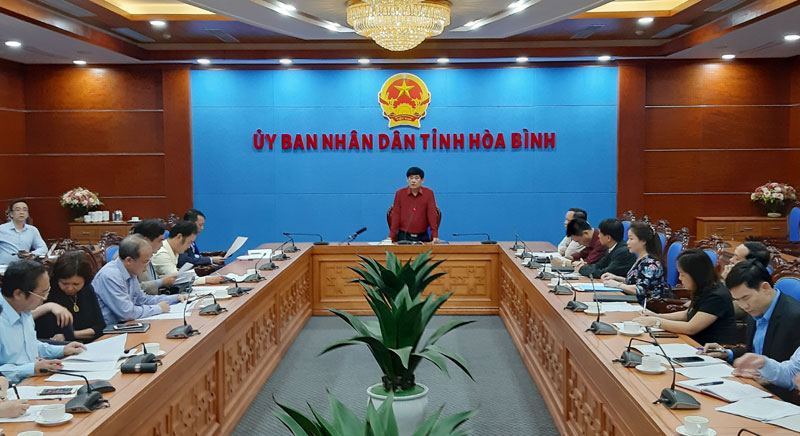
(HBO) – Vice Chairman of the provincial People’s Committee Nguyen Van Dung chaired a recent conference to evaluate an investment project on assisting 36 poorest villages in the province.
Photo:
Vice Chairman of the provincial People’s Committee Nguyen Van Dung concludes
the conference
In 2013, the
province ranked 36 villages as the poorest with high rate of poverty, poor infrastructure,
and low income of local residents. On January 20, 2014, the provincial People’s
Committee issued Decision No.73/QD-UBND, approving a project on supporting
those localities with total investment of 133.9 billion VND. The project is
designed to improve local infrastructure, develop production to raise locals’
income, and preserve traditional cultural values.
After five years implementing the projects, the rate of poor and
near-poor households in those villages fell by an average 5 percent per year,
from 41 percent in 2014 to 31 percent in 2018. Roads and electricity facilities
have been built in most of the villages.
All capital allocated to production development has been disbursed.
Thanks to the project, Mai Hoang Son village in Mai Chau
district’s Mai Hich commune, and Dau Khu village in Hoa Binh city’s Thong Nhat
commune have escaped from poverty and been excluded from the list of poorest
villages in the province.
However, due to capital shortage, several targets of the project have not been
realised, with more than 60 percent of planned infrastructure items not
receiving investment yet. Some villages have not received investment for
building automobile-accessible roads and clean water facilities. There is a
lack of standard schools, cultural houses and irrigational systems, while the existing
facilities are degrading. In addition, although many production models have
shown efficiency, they have failed to produce pervasive effects. Particularly,
many villages have been hard hit by landslide and flooding in the past two
years, including So hamlet in Trung Thanh commune and Nhap village in Da Bac
district’s Dong Ruong commune, with most essential infrastructure and
production models destroyed./.
Hoa Binh province is undergoing a dynamic transformation amid Vietnam’s national digital transition. Building on Poliburo’s Resolution No. 57-NQ/TW on breakthroughs in science, technology, innovation, and national digital transformation, the province has rolled out a wide range of practical action plans. A standout initiative is the "Digital Literacy for All” movement, an effort to ensure that no one is left behind in the digital era.
Hoa Binh province is undergoing a dynamic transformation in the wake of the national digital transformation movement. Building on Resolution No. 57-NQ/TW of the Politburo on breakthroughs in science, technology, innovation, and national digital transformation, the province has implemented a wide range of practical action plans. A standout initiative is the "Digital Literacy for All” movement ambitious effort to ensure that no one is left behind in the digital age.
With a spirit of unity and proactive problem-solving, the Party Committee, the government and the people of Dong Lai Commune (Tan Lac District) have made great strides in implementing the resolutions of the 24th Party Congress of the commune for the 2020 - 2025 term. Focusing on leadership and practical actions, the commune has brought the Party’s resolutions into daily life, creating strong impacts and pushing the local development forward.
Amid the nationwide push for digital transformation, young people in Hoa Binh Province are stepping up as dynamic pioneers, applying technology to enhance Youth Union operations and expand the reach of youth-led initiatives. Through creativity and adaptability, Youth Union organizations at all levels have introduced a series of practical solutions, contributing to modern governance and community development.
In recent years, An Nghia commune, located in Lac Son district, has stepped up administrative reform, focusing on improving the quality and efficiency of its single-window service unit for receiving and processing administrative procedures. These improvements have helped create favourable conditions for local residents and organisations to handle administrative procedures, contributing to the commune’s broader socio-economic development.
The Prime Minister-approved master plan to develop the multi-use value of forests ecosystems through 2030, with a vision to 2050, aims to improve the management and sustainable use of forest resources, create jobs, increase incomes, and improve the living standards of ethnic minorities, people in mountainous and remote areas, forest workers and those living near forests.



